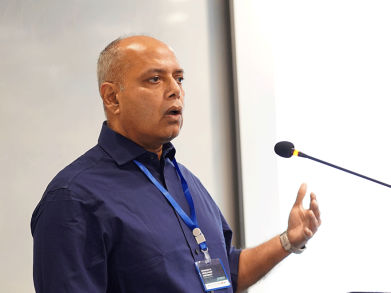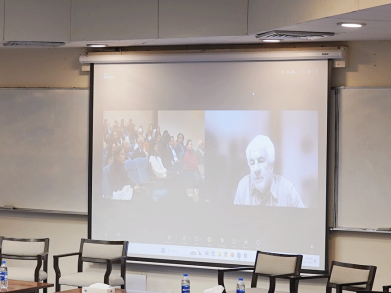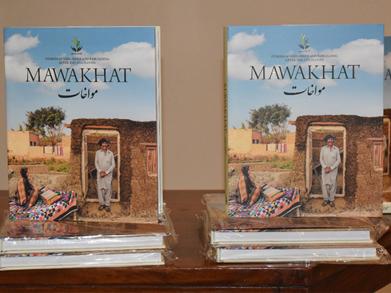This event was a book launch for two recent works on decolonisation and revolution in colonial India, Revolutionary Pasts by Dr. Ali Raza and A World Literature for the Wretched of the Earth by Dr. J. Daniel Elam. The discussant for the two books was Dr. Aamir Mufti. Held in collaboration with The University of Hong Kong (HKU), the event was moderated by Dr. Maryam Wasif Khan.
LUMS Live: Helping the Community Stay Connected and Informed
A majority of the world is confined to their homes as a result of the rapid spread of the Coronavirus. Classes at LUMS have also been moved online with majority of the staff and faculty working from home. However, just as LUMS has not let the current situation stop the students learning, it has also found a new way of keeping important conversations going.
LUMS Live, launched on March 29, 2020, is a platform that gives you the opportunity to tune in and connect with Dr. Arshad Ahmad, Vice Chancellor, LUMS and other eminent panelists as they discuss important topics. Discussions during these live sessions, hosted on the LUMS official Facebook page and moderated by Adeel Hashmi, cover topics from how to maintain good health, how to continue learning in the current environment and the changing role of technology to how to stay positive and the importance of being generous and empathetic to the people around us.
Explore our past sessions, and be sure to join us for the next session and become part of critical conversations during these unprecedented times.
LUMS Live Session 70: Empire and its Afterlives: Book Launch Revolutionary Pasts and A World Literature for the Wretched of the Earth
LUMS Live Session 69: Human Development, Climate Change and the Anthropocene
LUMS Live Session 69: Human Development, Climate Change and the Anthropocene
Our esteemed panel discussed the implications and limitations of the Planetary-pressures Adjusted Human Development Index introduced in UNDP’s 2020 Human Development Report, and further examined the importance of climate change for how we think of and measure human development. The panel also used these new findings to discuss policy measures, state commitments and societal actions that are needed to mitigate the human devastation of the planet.
Hosted in collaboration with the Mahbub ul Haq Research Centre (MHRC), as part of their Global Challenges Webinar Series, this session was moderated by Dr. Hadia Majid. Our distinguished panelists for this session included Dr. Ajay Chhibber, Dr. Adil Najam, Dr. Frances Stewart and Sir Richard Jolly.
LUMS Live Session 68: Three Faces of Agency in Feminist Economics: Capabilities, Empowerment and Citizenship
Professor Naila Kabeer will be discussing the three faces of agency in feminist economics and their implications for gender equality in the 21st century. Dr. Kabeer is the Professor of Gender and Development at the London School of Economics and Political Science. Her research interests include gender, poverty, social exclusion, labour markets and livelihoods, social protection and citizenship, and much of her research is focused on South and South East Asia. She is a leading feminist economist who has had a major impact on global thinking on gender, empowerment and citizenship.
Watch the sixty-eighth session of LUMS Live: Three Faces of Agency in Feminist Economics: Capabilities, Empowerment and Citizenship scheduled. Hosted in collaboration with the Mahbub ul Haq Research Centre (MHRC), as part of their Mahbub ul Haq Distinguished Lectures 2021, this session was moderated by Dr. Sohela Nazneen and Dr. Nida Kirmani.
LUMS Live Session 67: #ChooseToChallenge: Creating a Better Pakistan for Women
LUMS Live Session 67: #ChooseToChallenge: Creating a Better Pakistan for Women
March 8 is celebrated globally as International Women’s Day, offering us the opportunity to reflect on the status and rights of women from around the world, and the challenges they have faced and continue to confront.
This week we celebrate, honour, and discuss the trials and achievements of Pakistani women, their history of political and social activism, and their continued struggle for equal representation - we discuss obstacles in the path of an inclusive Pakistan and what spaces exist for reform and improvement.
Watch the sixty-seventh session of LUMS Live: #ChooseToChallenge: Creating a Better Pakistan for Women. The session was moderated by Ms. Mehreen Zahra-Malik. Our distinguished panelists were Ms. Meesha Shafi, Dr. Nida Kirmani, Ms. Fatima Razzaq, and Mr. Adnan Malik.
LUMS Live Session 66: Book Launch: Pakistan’s Political Parties
LUMS Live Session 66: Book Launch: Pakistan’s Political Parties
Pakistan's Political Parties: Surviving between Democracy and Dictatorship examines how the civilian side of the state’s current regime has survived the transition to democracy. It provides critical insights into the evolution of political parties in Pakistan and their role in democracies in general. A comprehensive collection of essays by researchers who have used interviews, surveys, data, and ethnography to shed light on the internal workings and motivations of these groups, the book gives the reader a holistic in-depth view of the current political landscape of Pakistan.
To learn more, watch the sixty-sixth session of LUMS Live: Book Launch: Pakistan’s Political Parties. Hosted in collaboration with the Mahbub ul Haq Research Centre (MHRC), as part of the Political Economy of Development Series, this session was moderated by Dr. Umair Javed. He was joined by authors of the book, including, Dr. Mariam Mufti, Dr. Sarah Khan and Dr. Asad Liaqat, who discussed the premise of the book, the country’s diverse party system and the state of Pakistan after its 2018 elections.
LUMS Live Session 65: After Ali Sadpara: Pakistan’s Mountaineering Challenges
LUMS Live Session 65: After Ali Sadpara: Pakistan’s Mountaineering Challenges
Every year hundreds of mountaineers from around the world arrive in Pakistan, home to five of the world’s 14 highest mountains, including the ‘killer’ K2. The months from June to August are prime mountaineering months and create many opportunities for mountaineering-related business in the country, helping Pakistan generate over PKR. 4-5 million in taxes and fees each year. With all summer climbing feats in Pakistan achieved, high-altitude mountaineers have increasingly been seeking to tackle the country’s winter challenges.
This year was a euphoric one for the Pakistani and the global climbing community, as a team of Nepali climbers became the first in history to complete a winter ascent of the K2. But the season soon after turned deadly when Muhammad Ali Sadpara - the only Pakistani to have climbed eight of the world's 14 highest mountains and the first ever to complete a winter ascent of Nanga Parbat in 2016 - went missing with two other climbers while attempting to the K2 winter ascent. A search and rescue operation went on for almost two weeks before the climbers were officially declared dead on February 18. Sadpara’s death, a great loss to the country, has also opened up some big questions about Pakistan’s mountaineering industry and the challenges it faces as well as presented an opportunity for reform.
Watch the sixty-fifth session of LUMS Live: After Ali Sadpara: Pakistan’s Mountaineering Challenges. The session was moderated by Mehreen Zahra-Malik. Our distinguished panelists were Mr. Karrar Haidri, Mr. Asghar Ali Porik, and Mr. Rao Ahmad.
LUMS Live Session 64: Technical Change, Inequality and Capitalist Development
LUMS Live Session 64: Technical Change, Inequality and Capitalist Development
Renowned Professor Daron Acemoglu, Institute Professor, Massachusetts Institute of Technology (MIT) will be discussing the evolution of technical change in capitalist economies and its implications for the 21st century challenges of rising wage inequality and political polarization. He will examine the role of policies in influencing the direction of labour-saving technical change.
To learn more, watch the sixty-fourth session of LUMS Live: Technical Change, Inequality and Capitalist Development. Hosted in collaboration with the Mahbub ul Haq Research Centre as part of their Mahbub ul Haq Distinguished Lectures 2021, the session was moderated by Dr. Shandana Khan Mohmand and Dr. Ali Cheema.
LUMS Live Session 63: Why Study the Humanities and Social Sciences?
LUMS Live Session 63: Why Study the Humanities and Social Sciences?
The world we live in is complex and ever-changing. However, in challenging times like ours, it is imperative that we understand our surroundings and the intricacies of the problems that plague us. This is why we are continuing to see a shift towards humanities and social sciences education around the world.
A rich academic experience in the humanities and social sciences equips students with the tools to think critically, ask the right questions, develop empathy for the human condition, and look at the multiple contexts to modern challenges. To better apprise us of the value and importance of these subjects, we turn to experts who have studied, taught and done valuable work in the field.
Watch the sixty-third session of LUMS Live: Why Study the Humanities and Social Sciences? The session was moderated by Dr. Ali Raza. Our distinguished panelists included Dr. Ali Khan, Dr. Sameen Mohsin Ali, Dr. Saba Pirzadeh and Ms. Nihan Rafique.
LUMS Live Session 62: The Urbanisation of Pakistan and Telecom
LUMS Live Session 62: The Urbanisation of Pakistan and Telecom
Pakistan’s current population is about one-third urban. However, this figure will rise to nearly 50% by 2025. A direct proportional relation exists between urbanisation and the growth of the telecom industry of Pakistan. As per a recent article in DAWN, the Pakistan Telecom Authority (PTA) has noted that the “contribution of the telecom sector to the national exchequer has increased by 129 per cent in the fiscal year ending in June 2020 compared to a year ago owing to COVID-19 lockdown”.
What have been the causes of this exponential growth of the telecom industry in the country? How is urbanisation and the telecom industry interconnected? How equipped is Pakistan’s telecom infrastructure to propel the country towards digitalisation?
To learn more, watch the sixty-second session of LUMS Live: The Urbanisation of Pakistan and Telecom. The session was moderated by Dr. Zartash Uzmi. Our distinguished panelists included Dr. Syed Ismail Shah, Mr. Ahmed Bilal Masud, and Mr. Parvez Iftikhar.
LUMS Live Session 61: Pakistani Music: Yesterday, Today and Tomorrow
LUMS Live Session 61: Pakistani Music: Yesterday, Today and Tomorrow
Music is often referred to as food for the soul. The music of Pakistan stems from diverse areas with elements from various parts of South Asia as well as Central Asian, Middle Eastern, and modern-day Western popular music. With these multiple influences, a distinctive Pakistani music has emerged.
Who are the legends of our music? What has been its journey? How far has it influenced others across the globe? How has it served as a tool for activism?
To learn more, join the sixty-first session of LUMS Live: Pakistani Music: Yesterday, Today and Tomorrow. The session was moderated by Adeel Hashmi. Our distinguished panelists included Mr. Arshad Mahmud and Dr. Taimur Rahman.






















